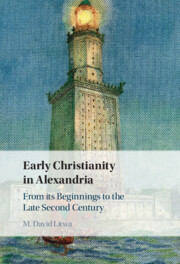Book contents
- Early Christianity in Alexandria
- Early Christianity in Alexandria
- Copyright page
- Dedication
- Contents
- Tables
- Acknowledgments
- Note on the Text
- Abbreviations
- Introduction
- Part I Beginnings
- Part II Early Christian Teachers and Movements in Alexandria
- 6 The Earliest Alexandrian Theologians
- 7 Eugnostus and the Wisdom of Jesus Christ
- 8 Julius Cassianus and Alexandrian Ascetic Culture
- 9 Valentinian and Marcionite Currents
- 10 The Naassene Preacher
- Conclusion
- Bibliography
- Index
Conclusion
The “Great Church” and the Many Schools of Alexandria
from Part II - Early Christian Teachers and Movements in Alexandria
Published online by Cambridge University Press: 14 December 2023
- Early Christianity in Alexandria
- Early Christianity in Alexandria
- Copyright page
- Dedication
- Contents
- Tables
- Acknowledgments
- Note on the Text
- Abbreviations
- Introduction
- Part I Beginnings
- Part II Early Christian Teachers and Movements in Alexandria
- 6 The Earliest Alexandrian Theologians
- 7 Eugnostus and the Wisdom of Jesus Christ
- 8 Julius Cassianus and Alexandrian Ascetic Culture
- 9 Valentinian and Marcionite Currents
- 10 The Naassene Preacher
- Conclusion
- Bibliography
- Index
Summary
The conclusion tackles two lingering problems in Alexandrian church history: the meaning of the “great church” of Alexandria and the “catechetical school.” Despite Celsus’s use of the “great church,” no Christian group in Alexandria could convincingly claim numerical superiority in the second century. The use of numbers or quantitative contrasts were largely rhetorical, not demographical statements. Origen indicates that a number of alternative Christian groups flourished in his youth, and some of these groups could be represented by the Second Discourse of Great Seth and the Coptic Apocalypse of Peter. 2 Clement, if taken to be Alexandrian, does not indicate that incipient catholics had the upper hand. The catechetical school run by Origen in the early third century did not have a clear institutional antecedent. Throughout the second century, there were multiple, mostly informal, Christian schools run by a variety of Christian teachers (e.g., Basilides, Carpocrates, Pantaenus) offering higher theological instruction.
- Type
- Chapter
- Information
- Early Christianity in AlexandriaFrom its Beginnings to the Late Second Century, pp. 168 - 180Publisher: Cambridge University PressPrint publication year: 2023



